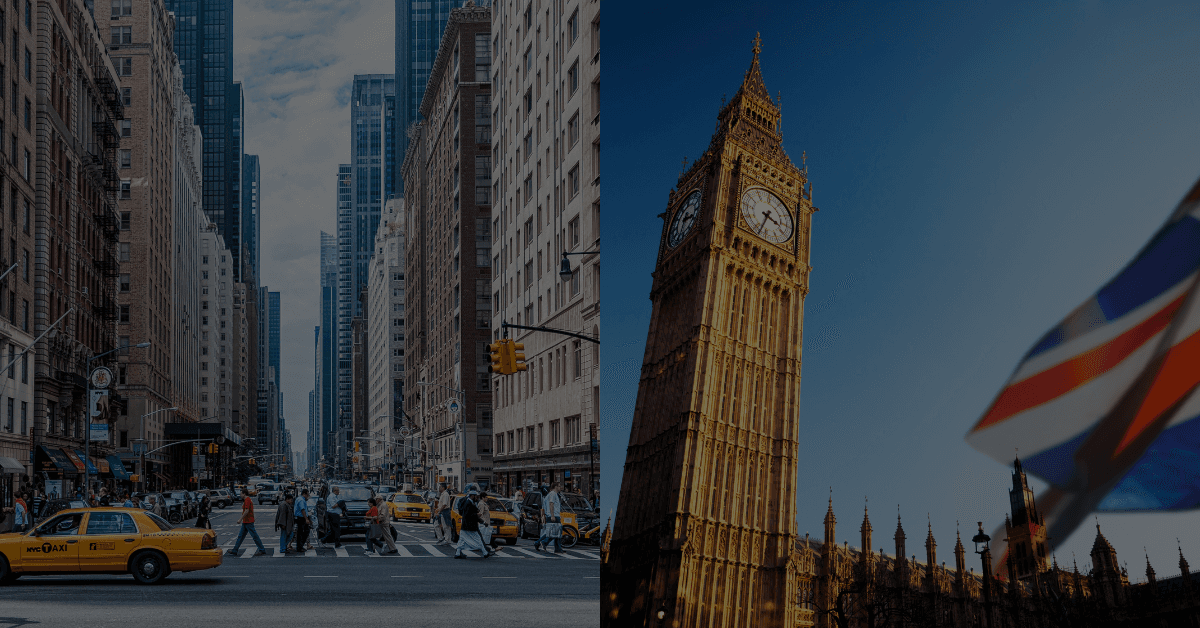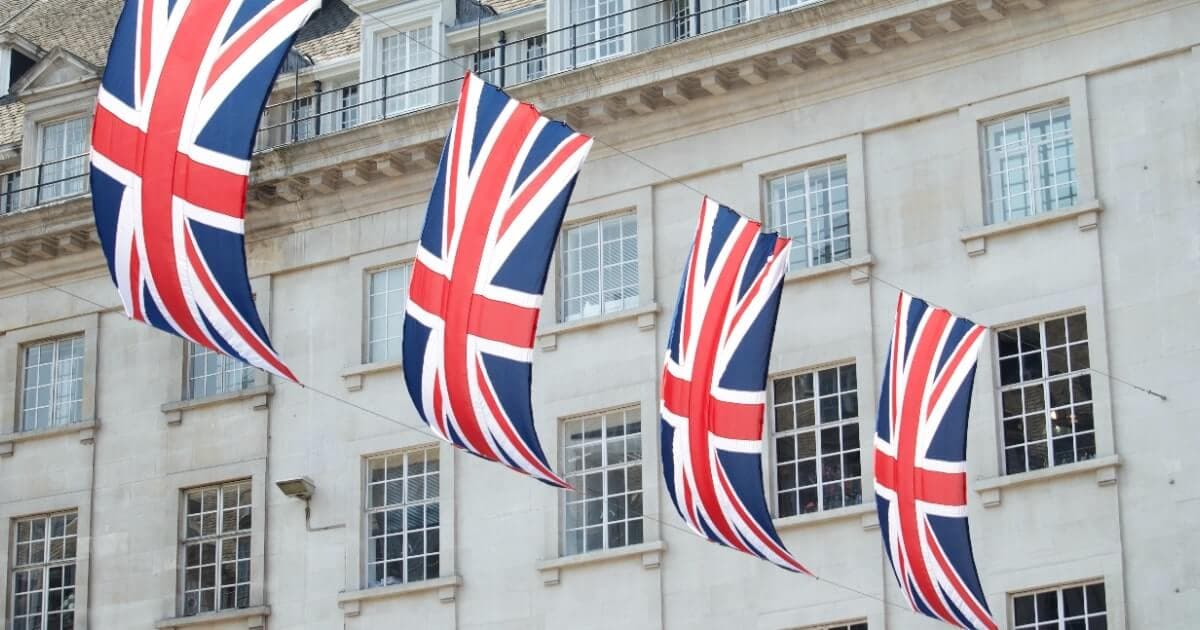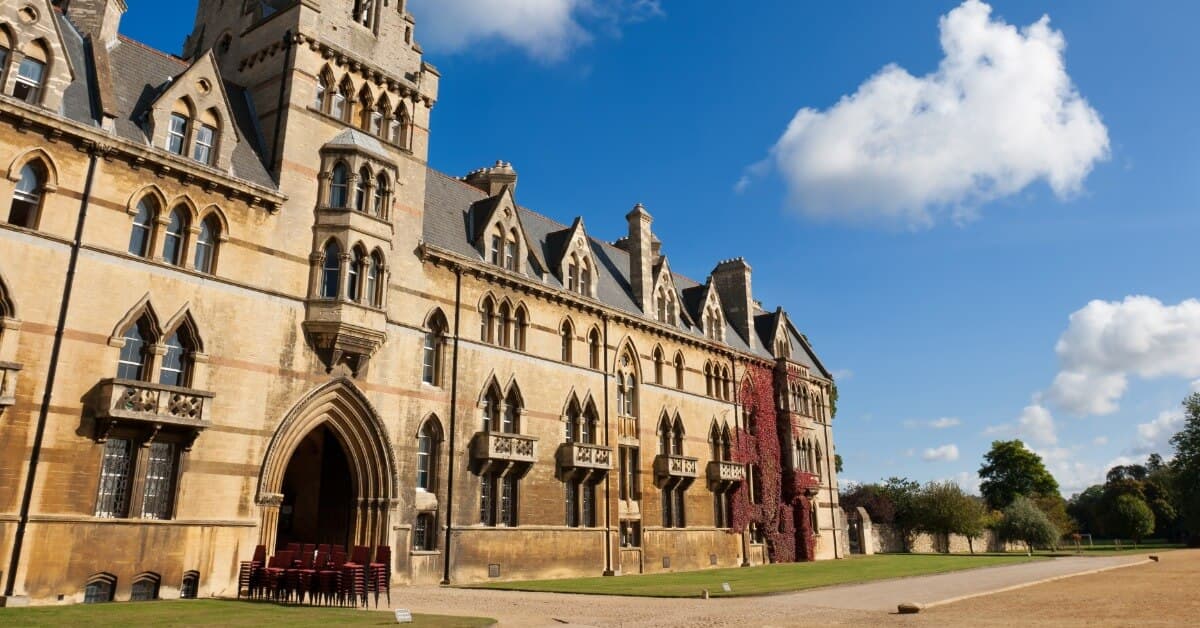What Is Dartmouth Known For?
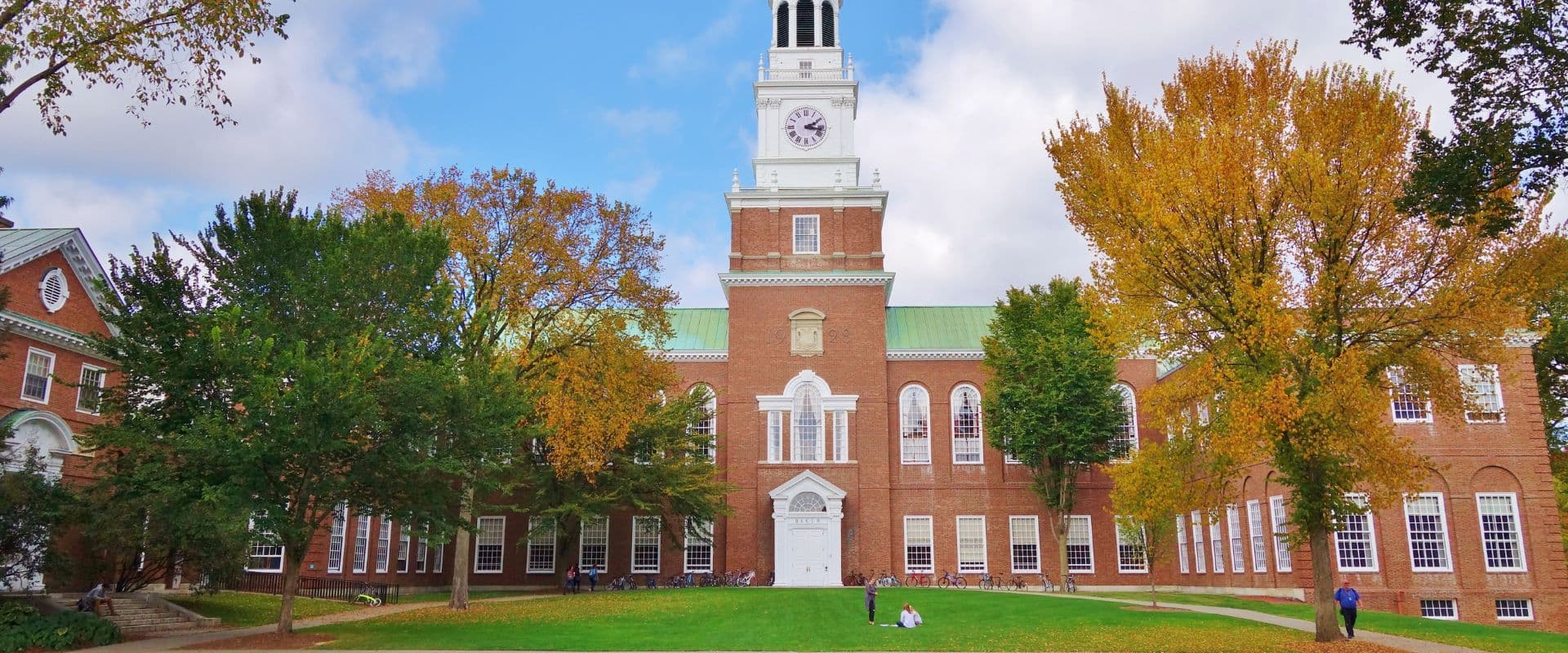
Summary
Dartmouth College, located in Hanover, New Hampshire, combines rigorous academics with a vibrant outdoor lifestyle. Dartmouth offers flexible education through its unique D-Plan, allowing customized schedules for internships, research, and study abroad. The college emphasizes community, small class sizes, and interdisciplinary learning. Highly selective with a 6.4% acceptance rate, the admissions process is holistic, now requiring SAT or ACT scores for the Class of 2029.
Nestled in the picturesque town of Hanover, New Hampshire, Dartmouth offers a unique blend of rigorous academics and outdoor adventures.
Despite being one of the smallest Ivy League schools, Dartmouth offers students exceptional academic rigor and proximity to mountain resorts for hiking and skiing.
So let’s take a closer look at every part of Dartmouth, starting with the campus location and prominent academic programs.
Dartmouth’s Home: The City of Hanover
Hanover, New Hampshire, is a quintessential New England town. Its charm and slow pace of life provide a perfect backdrop for Ivy League academic pursuits.
Hanover offers a variety of restaurants, shops, and outdoor activities, making it an ideal location for students who enjoy a balance of study and recreation.
If you don’t fully believe how close Dartmouth is to nature sites, take note of the fact that Dartmouth’s Latin motto, “Vox clamantis in deserto” translates into “the voice of one crying out in the wilderness!”
Dartmouth Trivia: Do you know what Dartmouth’s mascot is?
Answer: This is actually a trick question, because Dartmouth doesn’t have an official school mascot!
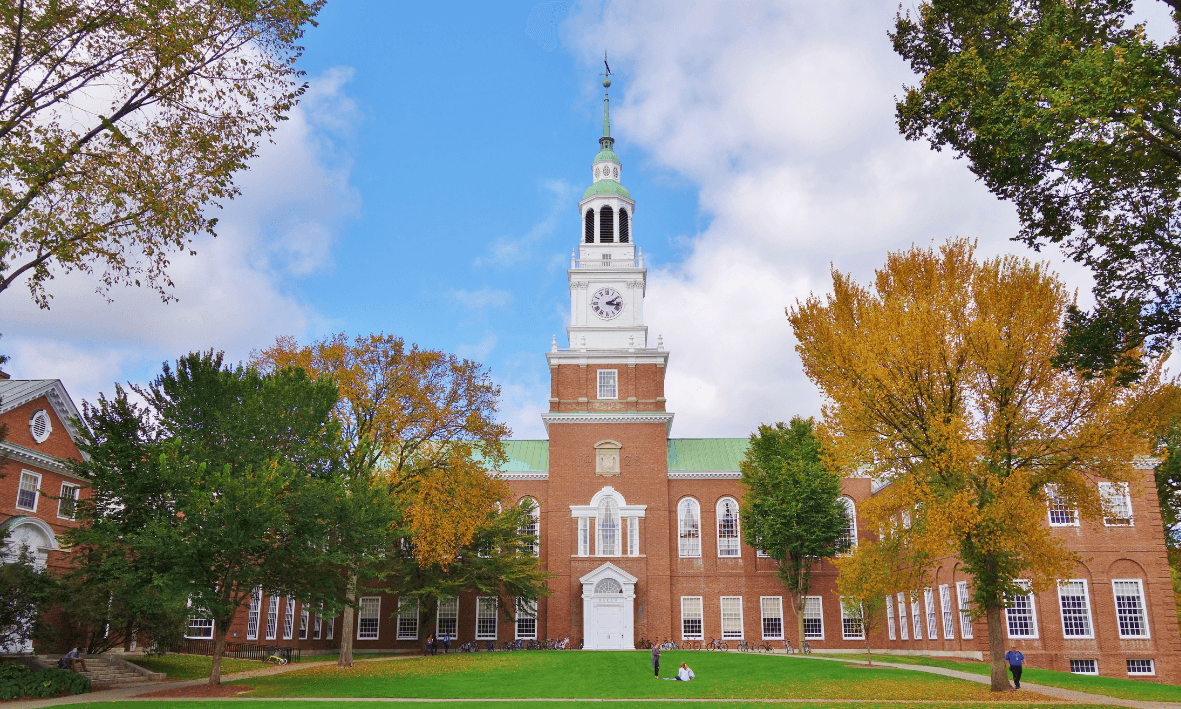
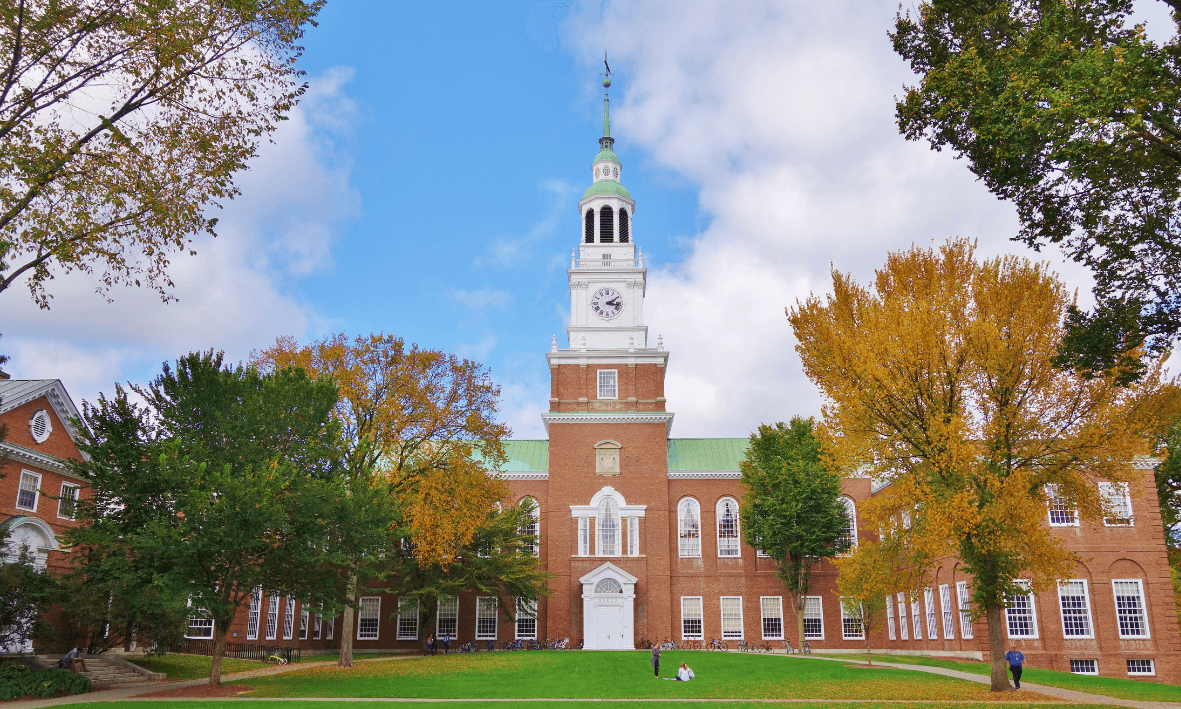
Breaking Down Dartmouth’s Academic Programs
Dartmouth is composed of several schools that cater to a variety of academic interests. The undergraduate college offers over 40 departments and interdisciplinary programs. The Geisel School of Medicine, the Thayer School of Engineering, and the Tuck School of Business are renowned for their graduate programs.
Top Majors and Programs at Dartmouth
Dartmouth is known for its strong programs in Economics, Government, Engineering, and Environmental Studies.
The Tuck School of Business is particularly notable – it consistently ranks among the top business schools in the world. The college's liberal arts curriculum encourages interdisciplinary study, preparing students for diverse career paths.
Most Popular Majors:
- Computer Sciences: Students interested in careers in Computer Science can get a head start by conducting research with faculty or completing extensive projects that showcase their mastery and skill work. With small class sizes, computer science majors at Dartmouth get 1:1 on support and guidance
- Social Sciences: Students studying social sciences not only acquire knowledge in fascinating areas of social inquiry, but they develop practical and transferrable critical thinking and communication skills along the way. By asking questions and examining pressing problems, students develop a new lens of the world they live in.
- Engineering: At Dartmouth, students study and live by the principle “we put people first.” This applies to studying engineering. The courses are structured with a human-centered approach to ensure the lessons in the classroom can be applied to the real world.
- Women’s, Gender & Sexuality Studies: Students are presented with a structured analysis of historical, political, economic, and social trends of gender construction. Gender Studies majors work closely with the Social Sciences department.
Did you know that you are able to develop your own Custom Major at Dartmouth?
With Dartmouth’s special D-Plan, students can fulfill their graduation requirements through multiple different programs and departments.
What Is Dartmouth’s D-Plan?
One of the most unique aspects of Dartmouth is the D-Plan, its flexible academic calendar. This quarter-system allows students to customize their academic schedules, taking advantage of off-campus internships, research, and study abroad programs. Imagine being able to apply for internships during the year when other students are in school full-time. Now you can!
The D-Plan lets you tailor your education to your interests and career goals. It offers unparalleled flexibility and opportunities. No other Ivy League school offers this type of flexibility in registration and scheduling.
No two D-plans are the same. How would you plan your academic schedule?
Here is an example look of what a student’s D-Plan might look like:
Student D-Plan Example
| Year | Fall | Winter | Spring | Summer |
|---|---|---|---|---|
| Year 1 | On (Resident) | On (Resident) | On (Resident) | Off (Leave) |
| Year 2 | On (Resident) | Off (Leave) | On (Resident) | On (Resident) |
| Year 3 | On (Resident) | Study Abroad | On (Resident) | On (Resident) |
| Year 4 | On (Resident) | On (Resident) | On (Resident) |
Dartmouth’s Traditions + History Fast Facts
Every college has their own colors to represent their school pride, but do you know why Dartmouth’s color is forest green?
Here’s a hint: It is not because of the lush forests in Hanover! In fact, the story behind Dartmouth’s forest green is surprisingly simple. Back in 1866, forest green was the only color not used by another college, so Dartmouth claimed it as their own!
Dartmouth Trivia: Do you know what movie was based on a Dartmouth student’s experience in Greek life?
Dartmouth’s Iconic Traditions:
- Orientation Trip: Incoming freshmen take part in “trips” , a pre-orientation, student-run five-day outdoor program, designed to welcome them to Dartmouth and bond with other freshmen.
- Homecoming Bonfire: The freshmen class builds a bonfire and runs around it a set number of times in concordance with their class year, while upperclassmen cheer them on. For the newly accepted class of 2028, this will total to be 128 laps!
- Polar Plunge: Students brave the icy water of the Occom Pond to participate in the annual Winter Carnival Polar Plunge!
- Tea & Cookies: Everyday at 4:00 PM students gather in Sanborn Library – home of the English department – for tea and cookies. It is estimated that 1000 cups of tea are served every year.
Dartmouth’s rich history has made it a household name
1771 - The year that Dartmouth’s first graduating class earned their diplomas! The Class of 1771 included just four students. Today, ~1,000 students graduate each year
1819 - Dartmouth College v. Woodward made its way to the United States Supreme Court. The highest court ruled that colleges are entitled to the same protections as individuals under the United States Constitution.
1960’s - Professor John Rassias developed the world famous Rassias Method for teaching foreign language that is still widely used today.
1970 - After 200 years, Dartmouth finally reinstalled its original mission to provide education to Indigenous groups by creating the first program of its kind.
2016 - Over the years, many Presidential Primary Debates have taken place on Dartmouth’s campus. This year marked the 14th time the debates took place on campus.
2024 - Sian Leah Beilock, the former President of Barnard College, was inaugurated as Dartmouth College’s first female President.
Dartmouth’s Notable Alumni
Dartmouth boasts an impressive list of alumni, including authors, politicians, business leaders, and scientists. The college’s alumni network is robust, offering current students and recent graduates numerous opportunities for mentorship, internships, and career advancement. Networking events and alumni clubs around the world help maintain strong connections within the Dartmouth community.
Dartmouth Trivia: Do you know which famous alumnus was busted for misconduct and adopted a pen name to continue writing for the college’s humor magazine?
Answer: Theodor Geisel – better known as Dr. Seuss – was busted for misconduct. But he adopted the pen name Seuss to continue writing for the college’s humor magazine!
There are hundreds of famous figures that you may not know are Dartmouth alumni. Here are some of them:
- Mindy Kaling - Mindy Kaling became famous for her work as a comedian, actress, and writer. You may recognize her from “The Office” and from “The Mindy Project.”
- Robert Frost - Robert Frost is known for his large collection of poetry. He often would write about the New England area and the different phases of life.
- Kirsten Gillibrand - Senator Gillibrand has dedicated her life to public service. She currently serves in the United States Senate for the State of New York.
- Rachel Dratch - Rachel Dratch rose to fame off of her appearances as a performer on “Saturday Night Live.” She is most well known for playing characters with funny dispositions.
- Will you be next on this list?
Deep Dive into Dartmouth’s Campus Life + Student Body
When you ask Dartmouth students to name their favorite parts of their Ivy League experience, the same answers emerge!
Favorite Parts of Dartmouth - From a Student’s Perspective
- Sense of Community: Dartmouth students rave about the sense of community and the college’s vibrant campus life. The small, tight-knit community allows for close relationships with professors and peers. The Upper Valley offers a serene, picturesque setting that balances the intensity of Dartmouth’s 10-week quarters.
- The Dining Hall Staff: Dining hall food can make or break a college experience, but a delicious meal served with a smile cannot be beat! The staff at Dartmouth dining services are beloved by students, often going above and beyond, with employees even being named by students!
- D-Plan: Students first-hand acknowledge the power of flexibility that comes with the D-Plan! The liberal arts programs equip students with the knowledge from the very start of their education to join the working world. The D-Plan often defines students’ undergraduate experience.
Want To Become Part of the Ivy League at Dartmouth?
Dartmouth is highly selective, with an acceptance rate of around 6.4%. The admissions process is holistic. It looks beyond test scores and GPAs to understand each applicant’s potential, character, and fit with Dartmouth’s community. Strong essays, recommendations, and extracurricular achievements are crucial.
Dartmouth’s New Test Policy
Important Update: Starting with the Class of 2029, Dartmouth will once again require students to submit their test scores, allowing students to choose whether to submit SAT or ACT scores. The average SAT score is around 1500, and the average ACT score is 34.
Worried about your test scores - resources are available to be well-prepared for the upcoming test dates for both the ACT and SAT.
Developing an Application for Acceptance: The Dartmouth Way
Dartmouth is one of the most sought-after schools in the US, and for good reason. Its picturesque campus, flexible schedule, and Ivy League status drive its single-digit admissions rates.
But with Crimson's help, students are 5.6x more likely to get into Dartmouth. We offer a range of services in college admissions consulting that can support you throughout your academic journey.
- Maximize your chances of admission by working with our college admissions consultants and get started with a free consultation.
- Learn more about academics, extracurriculars, and admissions by signing up for our events and webinars on the topics that interest you.
- For more insights, review our students' admissions results and learn about our story.
